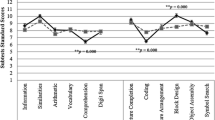Abstract
This study examined the relationship between adaptive functioning on the Vineland Adaptive Behavior Scale (VABS) and intellectual functioning on the Stanford-Binet Intelligence Scale, 4th edition (SB-IV) in autistic children and nonautistic retarded children of comparable CA and SB-IV composite score (IQ). The autistic group had lower scores than the retarded group in VABS adaptive composite, Socialization domain, and Communication domain, and SB-IV Verbal Reasoning area. VABS domain scores yielded higher classification rates than the SB-IV area scores in discriminating the two groups. Correlations between the two measures were much higher for the autistic group than for the retarded group. Results support the conclusion that the cognitive impairment in autism is reflected in greater impairment in adaptive behaviors than in mental retardation without autism.
Similar content being viewed by others
References
American Psychiatric Association. (1987).Diagnostic and statistical manual of mental disorders-revised (3rd ed., rev.). Washington, DC: Author.
American Psychiatric Association. (1994).Diagnostic and statistical manual of mental disorders (4th ed.). Washington, DC: Author.
Carpentieri, S. C., & Morgan, S. B. (1994). Brief report: A comparison of patterns of cognitive functioning of autistic and nonautistic retarded children on the Stanford-Binet, Fourth Edition.Journal of Autism and Developmental Disorders, 24, 215–223.
Freeman, B. J., Ritvo, E. R., Yokota, A., Childs, J., & Pollard, J. (1988). WISC-R and Vineland Adaptive Behavior scores in autistic children.Journal of the American Academy of Child and Adolescent Psychiatry, 27, 428–429.
Jarrold, C., Boucher, J., & Smith, P. (1993). Symbolic play in autism: a review.Journal of Autism and Developmental Disorders, 23, 281-xxx.
Rodrique, J. R., Morgan, S. B., & Geffken, G. (1991). A comparative evaluation of adaptive behavior in children and adolescents with autism, Down syndrome, and normal development.Journal of Autism and Developmental Disorders, 21, 187–196.
Rutter, M. (1983). Cognitive deficits in the pathogenesis of autism.Journal of Child Psychology and Psychiatry, 24, 513–531.
Rutter, M., & Schopler, E. (1987). Autism and pervasive developmental disorders: Concepts and diagnostic issues.Journal of Autism and Developmental Disorders, 17, 159–188.
Sparrow, S., Balla, D., & Cicchetti, D. (1984).Vineland Adaptive Behavior Scales. Circle Pines, MN: American Guidance Service.
Thorndike, R. L., Hagan, E. P., & Sattler, J. M. (1986).Guide for administering and scoring for the fourth edition: Stanford-Binet Intelligence Scale. Chicago: Riverside.
Van Bourgondien, M. E., Marcus, L. M., & Schopler, E. (1992). Comparison of DSM-III-R and Childhood Autism Rating Scale diagnoses of autism.Journal of Autism and Developmental Disorders, 22, 493–506.
Volkmar, F. R., Sparrow, S. S., Goudreau, D., Cicchetti, D. V., Paul, R., & Cohen, D. J. (1987). Social deficits in autism: An operational approach to using the Vineland Adaptive Behavior Scales.Journal of the American Academy of Child and Adolescent Psychiatry, 26, 156–161.
Author information
Authors and Affiliations
Additional information
This project was partially supported by a Center of Excellence grant from the State of Tennessee to the Department of Psychology, The University of Memphis. Appreciation is extended to the University of Tennessee Boling Center for Developmental Disabilities and to the children and parents who participated in this study.
Rights and permissions
About this article
Cite this article
Carpentieri, S., Morgan, S.B. Adaptive and intellectual functioning in autistic and nonautistic retarded children. J Autism Dev Disord 26, 611–620 (1996). https://doi.org/10.1007/BF02172350
Issue Date:
DOI: https://doi.org/10.1007/BF02172350




